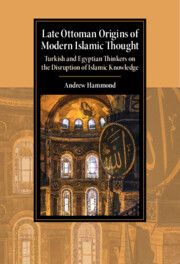 Late Ottoman Origins of Modern Islamic Thought
Late Ottoman Origins of Modern Islamic Thought Kevseri’s Defence of Sunni Traditionalism
Published online by Cambridge University Press: 03 November 2022
This chapter looks at Kevseri’s conflicts with the emerging Salafi trend. It looks first at his approach to ʿAbduh and the modernists, and how it differed from Sabri’s, then reviews the polemical debates between Kevseri and his Salafi opponents as they evolved from the 1920s to the early 1950s. While like Sabri he saw the tajdīd reformers as attempting to transform Islam into a calque on post-Enlightenment religion, Kevseri identified what would become the Salafi movement as more destabilising to the Islamic tradition, since it was speaking more authentically from within it with the aim of radically altering its multivocal, heterogenous disposition. It considers that Kevseri was able to delay the final semantic stabilisation of the term Salafi around the ideas that characterise the ideological movement of that name today, but that Syrian ʿālim Nāṣir al-Dīn al-Albānī used the work of Kevseri as a foil against which he was able to construct ’Salafism’ following Kevseri’s death.
To save this book to your Kindle, first ensure no-reply@cambridge.org is added to your Approved Personal Document E-mail List under your Personal Document Settings on the Manage Your Content and Devices page of your Amazon account. Then enter the ‘name’ part of your Kindle email address below. Find out more about saving to your Kindle.
Note you can select to save to either the @free.kindle.com or @kindle.com variations. ‘@free.kindle.com’ emails are free but can only be saved to your device when it is connected to wi-fi. ‘@kindle.com’ emails can be delivered even when you are not connected to wi-fi, but note that service fees apply.
Find out more about the Kindle Personal Document Service.
To save content items to your account, please confirm that you agree to abide by our usage policies. If this is the first time you use this feature, you will be asked to authorise Cambridge Core to connect with your account. Find out more about saving content to Dropbox.
To save content items to your account, please confirm that you agree to abide by our usage policies. If this is the first time you use this feature, you will be asked to authorise Cambridge Core to connect with your account. Find out more about saving content to Google Drive.